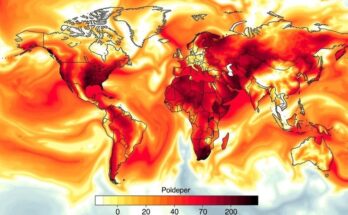The upcoming presidential election in Kansas carries significant implications for climate change policy amidst increasing environmental challenges. With competing narratives from candidates regarding the crisis, the election outcomes will shape local and global ecological futures. As severe weather events escalate, the need for decisive action is underscored, reflecting the stakes of this electoral decision for life on Earth.
The issue of climate change has increasingly risen to prominence in the discourse surrounding the upcoming presidential election, particularly in Kansas, where the effects are acutely felt. Recent events, such as the drying up of the Little Caney River, highlight the urgent need for reliable water resources in the face of escalating environmental challenges. Voter sentiments are divided, reflecting a spectrum of concerns from immigration policies to economic stability, yet amidst these discussions, the paramount issue of climate change looms large. Despite ranking lower on the list of immediate voter concerns, the escalating frequency of severe weather events underscores the critical nature of this election in determining the future of environmental policy. Doug Kluck, the regional climate services director at NOAA, warns of a trajectory toward increasingly catastrophic weather events, supported by a backdrop of record-breaking heat and destructive storms. The current presidential candidate from the Republican Party promotes a narrative dismissing climate science and advocating for increased fossil fuel production, raising concerns about the future of governmental institutions like NOAA itself. In stark contrast, the Democratic candidate, despite criticisms for a lack of detailed climate plans, has taken decisive action through vital legislation like the Inflation Reduction Act. The implications of this election extend far beyond national policies; they are fundamentally tied to the future viability of life on Earth. The American Institute of Biological Sciences has corroborated this urgency, stating, “The surge in yearly climate disasters shows we are in a major crisis with worse to come if we continue with business as usual.” The outcomes of this election will significantly influence climate policy and its associated impacts on both local and global environments.
The context of this commentary emphasizes the urgency of the climate crisis against the backdrop of the presidential election. The region’s environmental challenges are manifesting in increasingly severe droughts and extreme weather events, sparking a critical discourse among the electorate. The intersection of climate change with political governance highlights the stakes at play in shaping future environmental policy. As climate science becomes more urgent, the political landscape reflects diverging ideologies on how to address these pressing issues, making this election pivotal not just for the nation but for global ecological stability.
In summary, the upcoming presidential election is not merely a political contest; it represents a turning point for climate policy and the environment in Kansas and beyond. With extreme weather events becoming more common and widespread, the choices voters make will determine the future of environmental protections and efforts to combat climate change. The stakes are undeniably high, with the potential for irrevocable impacts on natural ecosystems and human communities alike. The contrast between the candidates’ positions underscores the importance of making informed choices that resonate with the urgent demands of our changing climate.
Original Source: kansasreflector.com




